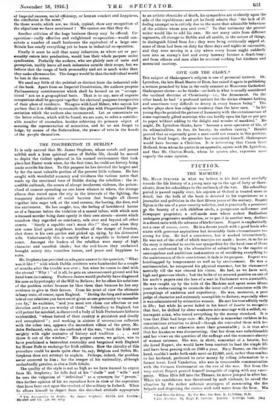THE INSURRECTION IN DUBLIN.*
IT is only natural that Mr. James Stephens, whose novels and poems exhibit such a keen spiritual sense of Dublin life, should be moved to depict the violent upheaval in lds normal environment that took place last Easter week when, for the first time, he could see history being made outside his door. To this purpose he haft devoted the largest and by far the most valuable portion of the present little volume. He has caught with wonderful accuracy and vividness the various notes that made up the emotional tone of Dublin during the rebellion : the incredible outbreak, the scenes of abrupt incoherent violence, the poisoncloud of rumour spreading no one knew whence or where, the strange silence that rested upon the city in the intervals of the fighting, the temporary destruction of social barriers that brought all classes together into eager talk at the road corners, the looting, the fires, and the excitement. He has caught, too, the feeling of bewildered horror as of a Samoan before the violation of a sacred taboo, with which men witnessed murder being done openly in their own streets—streets which somehow they regarded as sanctuary, safe over and beyond all other streets. "Surely a republic can't mean this!" they said when they saw some kind quiet neighbour, heedless of the danger of freedom, shot down in his own garden and picked up, dying, by his distracted wife. Unfortunately this is exactly what a republic in Ireland does mean. Amongst the leaders of the rebellion were many of high character and unselfish ideals-; but the evil forces they unolutined brought misery into countless homes, and peace and happiness to none.
Mr. Stephens has provided an adequate answer to the question, "What *atilt like ? " with which Dublin residents were bombarded for a couple of months after the trouble was over ; but when he comes to deal with the eternal "Why r' of it all, he gets on unaccustomed ground and his hand loses its cunning. Professor James would probably have diagnosed his case as hypertrophy of the Will to Believe; for he offers his solutions of the problem rather because lie likes them than bemuse he has any evidence to give in their favour. From his point of view the ultimate infamy rests, of course, upon England. "During the long and miserible talessf.our relations you have never given us one generosity to remember you by," he exclaims, and you must not claim our affection or our devotion until you are worthy of them." Subsidiary to England, but still potent for mischief, is discovered a body of Irish Protestants hitherto unidentified, " whose hatred of -their country is persistent and deadly and unexplained " ; and working in sinister if unconscious collusion -with the other two, appears the immediate villain of the piece, Mr. John Redmond, -who, on the outbreak of the war, "took the Irish case weighty with eight centuries of history and tradition . . . and threw it out of the 'window." His proper course, we gather, was to have proclaimed a benevolent neutrality and bargained with England for Home Rule in exchange for Irish soldiers. How the chivalry of this procedure could be made quite clear to, say, Belgium and Serbia Mr. Stephens does not attempt to explain. Perhaps, indeed, the problem never occurred to him ; for the tamper of his nationality, although undoubtedly gangue, is also a little febrile.
The quality of the style is -not so high as we have learned to expect from Mr. Stephens ; lie falls foul of his " shells " and "wills " and he nen the vulgarism of " individual " ZS a synonym for "person." One further opinion of his we reproduce here in view of the aspersions that have been cast upon the conduct of the military in Ireland. When he allows himself to demist from the detached -attitude appropriate to an artistic chronicler of death, his sympathies are evidently upon the side of the republicans; and yet he freely admits that "the lack of ill. feeling amongst us is entirely due to the more than admirable behaviour of the soldiers whom you sent over." To that testimony the present writer would like to add his own. He met many units from different regiments, all strange to Dublin and all unable, in the nature of things, to dietinguish friend front foe ; they were be'ng continually sniped at, some of them had been on duty for throe days and nights in succession, and they were moving in a city where every house might suddenly turn into an enemy's fort and every laneway become a death-trap ; and from officers and men alike he received nothing but kindness and unwearied courtesy.












































 Previous page
Previous page